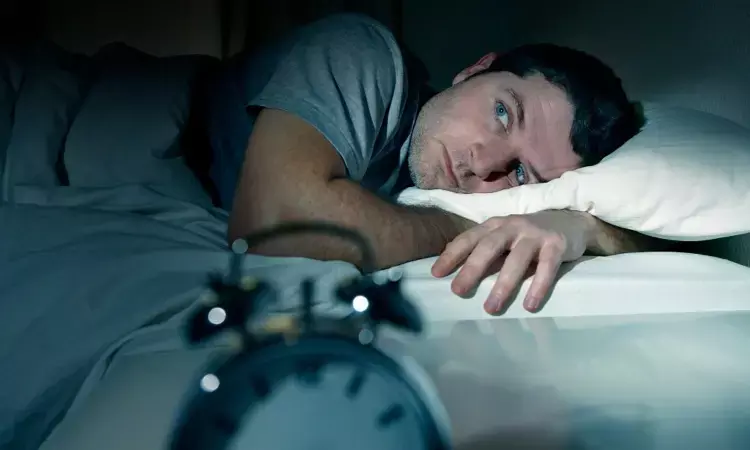- Home
- Medical news & Guidelines
- Anesthesiology
- Cardiology and CTVS
- Critical Care
- Dentistry
- Dermatology
- Diabetes and Endocrinology
- ENT
- Gastroenterology
- Medicine
- Nephrology
- Neurology
- Obstretics-Gynaecology
- Oncology
- Ophthalmology
- Orthopaedics
- Pediatrics-Neonatology
- Psychiatry
- Pulmonology
- Radiology
- Surgery
- Urology
- Laboratory Medicine
- Diet
- Nursing
- Paramedical
- Physiotherapy
- Health news
- Fact Check
- Bone Health Fact Check
- Brain Health Fact Check
- Cancer Related Fact Check
- Child Care Fact Check
- Dental and oral health fact check
- Diabetes and metabolic health fact check
- Diet and Nutrition Fact Check
- Eye and ENT Care Fact Check
- Fitness fact check
- Gut health fact check
- Heart health fact check
- Kidney health fact check
- Medical education fact check
- Men's health fact check
- Respiratory fact check
- Skin and hair care fact check
- Vaccine and Immunization fact check
- Women's health fact check
- AYUSH
- State News
- Andaman and Nicobar Islands
- Andhra Pradesh
- Arunachal Pradesh
- Assam
- Bihar
- Chandigarh
- Chattisgarh
- Dadra and Nagar Haveli
- Daman and Diu
- Delhi
- Goa
- Gujarat
- Haryana
- Himachal Pradesh
- Jammu & Kashmir
- Jharkhand
- Karnataka
- Kerala
- Ladakh
- Lakshadweep
- Madhya Pradesh
- Maharashtra
- Manipur
- Meghalaya
- Mizoram
- Nagaland
- Odisha
- Puducherry
- Punjab
- Rajasthan
- Sikkim
- Tamil Nadu
- Telangana
- Tripura
- Uttar Pradesh
- Uttrakhand
- West Bengal
- Medical Education
- Industry
Subcutaneous apomorphine infusion promising against insomnia in PD patients

A new study published in The Lancet Neurology showed that subcutaneous apomorphine infusion at night, decreased sleep disruptions based on differences in Parkinson's disease sleep scale (PDSS) score.
Insomnia is a common complaint among Parkinson's disease patients, and it has a detrimental impact on quality of life. Patients suffering from Parkinson's disease-related sleeplessness would benefit greatly from drugs that enhance both sleep and parkinsonism. As a result, Valérie Cochen De Cock and colleagues undertook this trial to assess the safety and effectiveness of subcutaneous night-time only apomorphine administration in Parkinson's disease patients with insomnia.
This was a randomized, double-blind, multicenter, placebo-controlled crossover experiment conducted in 11 French Parkinson's disease and sleep centers. Participants aged 35–90 years old with variable Parkinson's disease and moderate to severe insomnia were randomly randomized to receive either night-time subcutaneous apomorphine (up to 5 mg/h) or a corresponding placebo initially. Randomization was carried out in blocks of four, stratified by center, using a computer-generated scheme. This was followed by a 14-night washout interval before switching to the second intervention. The treatment durations were divided into a 10-night titration phase and a 7-night fixed-dose phase. During the titration period, the dosage was adjusted based on a daily phone call measuring sleep quality and treatment tolerance. The change in PDSS scores from the start to the conclusion of each treatment session was the main effectiveness outcome. The study was conducted with the intent-to-treat principle in mind.
The key findings of this study were as follow:
1. 46 people were registered between January 31, 2017 and January 29, 2021.
2. 25 patients (54%) were randomly randomized to receive apomorphine first, while 21 individuals (46%) received placebo first.
3. When compared to placebo, the mean change in PDSS score was substantially larger with night-time apomorphine infusion.
4. Adverse events were recorded by 25 (54%) of individuals during the apomorphine phase and 17 (37%) during the placebo period (p=016).
5. Apomorphine was shown to cause greater dizziness than placebo.
In conclusion, this medication might help people with advanced Parkinson's disease who have moderate to severe insomnia control their sleep disruptions.
Reference:
De Cock, V. C., Dodet, P., Leu-Semenescu, S., Aerts, C., Castelnovo, G., Abril, B., Drapier, S., Olivet, H., Corbillé, A.-G., Leclair-Visonneau, L., Sallansonnet-Froment, M., … Roze, E. (2022). Safety and efficacy of subcutaneous night-time only apomorphine infusion to treat insomnia in patients with Parkinson's disease (APOMORPHEE): a multicentre, randomised, controlled, double-blind crossover study. In The Lancet Neurology (Vol. 21, Issue 5, pp. 428–437). Elsevier BV. https://doi.org/10.1016/s1474-4422(22)00085-0
Neuroscience Masters graduate
Jacinthlyn Sylvia, a Neuroscience Master's graduate from Chennai has worked extensively in deciphering the neurobiology of cognition and motor control in aging. She also has spread-out exposure to Neurosurgery from her Bachelor’s. She is currently involved in active Neuro-Oncology research. She is an upcoming neuroscientist with a fiery passion for writing. Her news cover at Medical Dialogues feature recent discoveries and updates from the healthcare and biomedical research fields. She can be reached at editorial@medicaldialogues.in
Dr Kamal Kant Kohli-MBBS, DTCD- a chest specialist with more than 30 years of practice and a flair for writing clinical articles, Dr Kamal Kant Kohli joined Medical Dialogues as a Chief Editor of Medical News. Besides writing articles, as an editor, he proofreads and verifies all the medical content published on Medical Dialogues including those coming from journals, studies,medical conferences,guidelines etc. Email: drkohli@medicaldialogues.in. Contact no. 011-43720751


